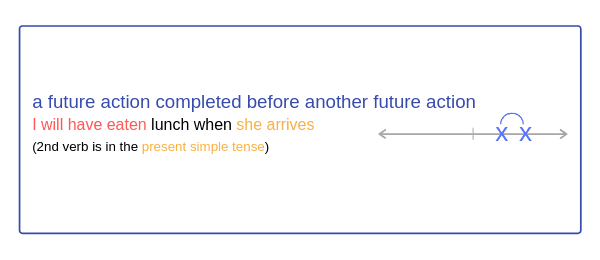ref – https://www.natterandramble.co.uk/future-perfect-tense-timeline-form-uses/

The Future Perfect tense expresses action in the future before another action in the future.
Future perfect framework:
[will] + [have] + [past participle]
If you see a subordinate conjunction + simple present, we use future perfect.
- by
- before
- at
- when
Future Simple: “What will happen?” (Focus on the future action)
Future Perfect: “What will have been completed?” (Focus on the completion of the action by a future time)
(present)——— I left ——— you read this ———(future)
How to Form a Future Perfect Example Practice
ex:
1) [before] they arrive. (sub conj + present simple tense)
2) I will have returned. (future perfect)
I will have returned before they arrive.
(present)——— I return ——— they arrive ———(future)
ex:
1) Alice will have returned home. (future perfect)
2) [when] the store closes. (sub conj + present simple tense)
Alice will have returned home when the store closes.
(present)——— Alice returns home ——— store closes ——— (future)
ex:
1) [Next] July starts (subj conj + present simple tense)
2) We will have received our degree. (future perfect)
By next July, we will have received our degree.
ex:
1) [By] next summer (subj conj + present simple tense)
2) We will have built the bridge.
By next summer, we will have built the bridge.
ex:
1) [when] they arrive. (subj conj + present simple tense)
2) We will have eaten.
We will have eaten when they arrive.
ex:
1) I will have eaten. (future perfect)
2) [before] the party starts. (subj conj + present simple tense)
Before the party starts, I will have eaten.
I will have eaten before the part starts.
ex:
1) [when] The click strikes twelve. (subj conj + present simple tense)
2) We will have perished. (future perfect)
The soldiers will have perished when the clock strikes twelve.
ex:
1) [at] ten o’clock (subj conj + present simple tense)
2) I will have finished showering (future perfect)
I will have finished showering at ten o’clock.
(present)——— finish shower ——— ten o’clock ——— (future)
How to Identify
- Future Simple: “What will happen?” (Focus on the future action)
- Future Perfect: “What will have been completed?” (Focus on the completion of the action by a future time)
They (build)____________ a new school by next year.
(completion of building a new school, so use Future Perfect ‘will have built’)
If you leave now, you (miss) ______________ the bus.
(future action of missing the bus, so Future Simple ‘will miss)
By the time he gets here, the movie (start) __________________.
It indicates that one action (the movie starting) will be completed before another future action (his arrival), so use Future Perfect ‘will have started’)
By this time next week, we (be) ________________ on vacation. (future action of being on vacation, so Future Simple ‘will be’)
In a few years, technology (change) ____________drastically.
(completion of technological change, so Future Perfect ‘will have changed’)
By the end of the year, I (read) ___________________ fifty books.
(completion reading 50 books, Future Perfect so “will have read”)